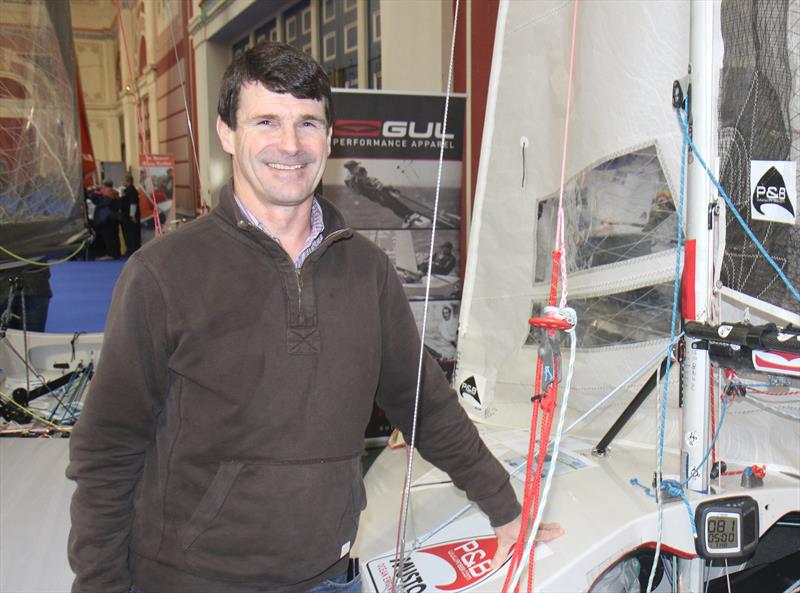
The evergreen Race Master & Micro Compass: We talk to Greg Wells
by Mark Jardine 18 May 2016 11:35 BST
18 May 2016

Greg Wells at the RYA Suzuki Dinghy Show © Mark Jardine
We talk to Greg Wells of Raymarine about the evergreen Race Master and Micro Compass and why they are still so popular on the racing scene today.
Mark Jardine: What is it about the Race Master in particular that has stood the test of time and means that it is still the compass of choice for wind tactics?
Greg Wells: I think the main reason why the Race Master still excels, and actually the Micro Compass as well, is to a very big extent the twin display. The fact that you've got two LCDs giving an angle, which means whether you're trapezing perpendicular to the devices or even sometimes slightly in front, you can still read the information. It's all very well having a nice device that's giving you good compass information, but if you can't see the numbers then they're worthless. I think the second point is that the LCD display is extremely good, particularly in daylight. It's crisp, it's clear and it's a self-powered device, it doesn't require any batteries.
MJ: It's always made life so simple; the pre-start, setting up the tacking angles and then just having those plus and minus figures, and of course resetting it for whenever there's a wind shift – just a single press of a button. How originally did you come up with that idea and make that the interface of choice?
GW: I've got to be honest, I think some credit has to go to Mark Rushall and Steve Cockerill who were involved with the Tacktick team in the early days in terms of what a racing sailor wanted, and he helped in terms of the ideas if you like. Then obviously Mark Johnson, the designer of the product, put those ideas into place. It was always a little bit tricky because you've only got four keys that you can use, so trying to get the user interface so to speak, simple with just four buttons - none of this touch screen, elaborate, user-interfaces we have on iPhones today - you have to do it with just a few buttons. I think we hit it on the head pretty easily, and I think once people got used to it they can use it very easily and see the benefits.
MJ: Many classes actually disallow GPS, so are there any other functions that you could think of that you would have added nowadays if you were building the compass, which come into those rule restrictions?
GW: The interesting thing about the Race Master is actually you can add a GPS to it, but not within the box itself, it's a separate device. However, the area of GPS in dinghy sailing I think is an interesting one. Is it good for the sport to have the start line features, how far you are away from the line? Is it good to have the VMG boat speed on a dinghy? I'm not sure, as I said it's a big debate. Actually, I think it will probably come along - technology generally does win over in these situations. It might actually be good because it might mean that people start cleaner and we have less black flags and fairer starts. I believe that a time is coming for Raymarine and the Race Master to probably incorporate a device with a GPS and add some other boat speed and start line type functionality.
MJ: So in that case, it's watch this space! With the Micro Compass, which is the direct replacement for an analog compass on a boat, what is the appeal of the device on dinghies?
GW: Again, like the Race Master, the Micro Compass has the two LCD screens and it has a race timer with count-down / count-up on it. Like the Race Master it is self powered - it never needs any batteries. It lasts much longer than usually the racing life of certainly many suits of sails. It floats and it's just very easy, it's very accurate and it's basically about simplicity and the fact that you can see it.
MJ: Well Greg, many thanks for your time.
GW: Thank you.
Read Raymarine's Free Handy Guide and Top Tips by Mark Rushall, one of the UK's best known and most successful sailing coaches, as to how to get the most out of your Raymarine Race Master and Raymarine Micro Compass.